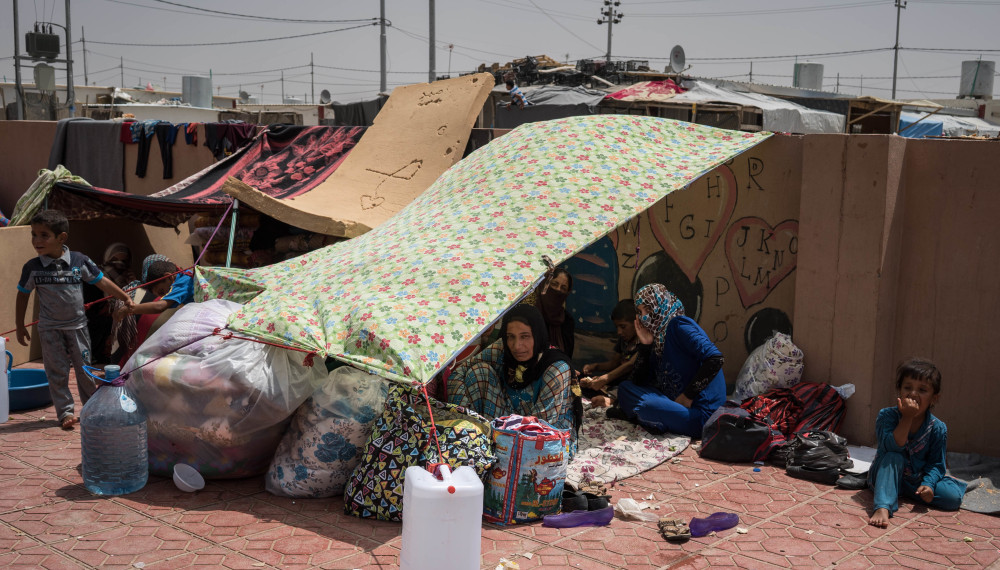DIBAGA CAMP, Iraq — Camps for displaced civilians in Iraq’s north are overflowing as Iraqi forces push toward the Islamic State-held city of Mosul, forcing thousands to flee.
Just southeast of Mosul, the Dibaga camp for Iraqis displaced from Nineveh province is steadily expanding. In the camp’s center, crowds of angry young men swarm administrative offices demanding proper shelter or permission to leave the camp entirely.
In one section separated from the rest of the camp, families call through chain link fences in search of loved ones partitioned by a long interrogation process.
As many as 3,000 people have arrived here in the last week, according to the camp’s administration. The more than 28,000 people living here are sheltered in a patchwork of tents, prefab containers, makeshift shelters and municipal buildings, or just sleeping out in the open.
As the first stages of the operation to retake Mosul from the Islamic State progresses, up to 1 million more people are expected to be forced from their homes by violence, according to the United Nations and the International Committee of the Red Cross. But local officials and aid groups are already struggling to cope with the current, smaller-scale influx.
Poor planning and limited resources during the operation to push the Islamic State out of Fallujah this summer left tens of thousands of civilians stuck in the Anbar Province desert with no shelter and little food and water. As Iraq’s military slowly pushes up toward Mosul from the recently secured Qayyarah airbase west of the Tigris River, Iraqi commanders say they are trying to mitigate the humanitarian fallout by encouraging some families not to flee.
“The situation for the displaced inside the camps is terrible,” said Iraqi army Col. Faris Bashir al-Dulaimy of the Nineveh operations command in Makhmour. “Our forces are having more people staying inside their houses as we advance,” he said, explaining that there isn’t sufficient infrastructure to accommodate repeated large influxes of people in need of aid.
Previous operations against the Islamic State entirely emptied cities and villages of civilians in an effort to remove them from harm’s way. But encouraging people to stay could expose civilians to Islamic State counterattacks that commonly follow the “liberation” of territory from the militant group.
Abdullah Ahmed and his young family walked through the desert for two days to reach safety after fleeing the village of Qayyarah that was previously under Islamic State control. Their youngest son almost died during the journey. Ibrahim, 7 months old, fainted from dehydration and had to be revived by an Iraqi military medic.
Once at Dibaga camp, the family found only flattened cardboard boxes to sleep on in an open courtyard beside the camp’s administrative offices. “No matter the conditions we are happy to be here,” Ahmed said.
He described his family’s last days in their hometown as terrifying. As Iraqi forces closed in on Qayyarah, he said, Islamic State fighters carried out mass executions in public view.
“If you went there right now you would still see the bodies filling all the main traffic circles,” Ahmed said.
But others at the camp balked at the harsh conditions and strict screening that requires most men to be interrogated for a week or more and their identity cards to be seized in an effort to control movement.
Send questions/comments to the editors.



Success. Please wait for the page to reload. If the page does not reload within 5 seconds, please refresh the page.
Enter your email and password to access comments.
Hi, to comment on stories you must . This profile is in addition to your subscription and website login.
Already have a commenting profile? .
Invalid username/password.
Please check your email to confirm and complete your registration.
Only subscribers are eligible to post comments. Please subscribe or login first for digital access. Here’s why.
Use the form below to reset your password. When you've submitted your account email, we will send an email with a reset code.